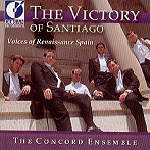It’s easy to hear why the Concord Ensemble was the Grand Prize winner in the Dorian/Early Music America Recording Competition. In a field that boasts some of the classical music world’s most accomplished and seasoned performers, this new male sextet (countertenor, three tenors, baritone, and bass), formed in 1996, shows incredible poise and demonstrates interpretive nuances and intuitive communicative skills typical of groups who’ve been together much longer. Their style is at once demonstrative and personable–it’s unpretentious yet polished, refined yet definitely of the earth. The very first track, a lively example of the 16th-century style known as “ensalada”–a mixture of languages as well as sacred and secular themes, polyphony and chordal texture–is a perfect introduction to the entire program, which offers a delightful blend of different styles and composers, performed with absolutely convincing interpretations of the music’s manner and textual meaning. Most prominent and memorable are several very lovely works by Vasquez, Morales, and Victoria–gems that we don’t usually hear anywhere, and are rarely performed this expertly.
































